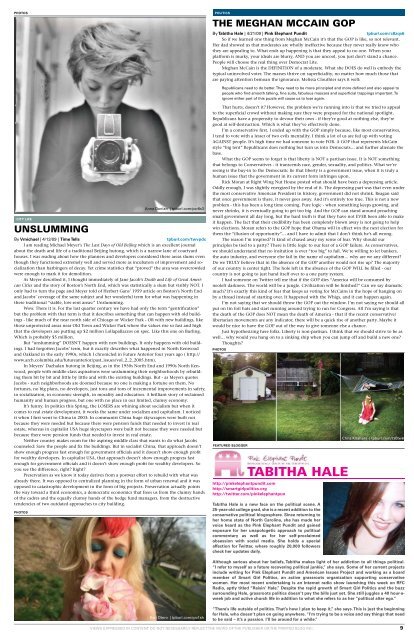You also want an ePaper? Increase the reach of your titles
YUMPU automatically turns print PDFs into web optimized ePapers that Google loves.
PhoTos<br />
CiTy life<br />
unsluMMinG<br />
By vmichael | 4/13/09 | Time Tells tpburl.com/twvpdc<br />
I am reading Michael Meyer’s The Last Days of Old Beijing which is an excellent journal<br />
about the death and life of a traditional Beijing hutong, which is a narrow lane of courtyard<br />
houses. I was reading about how the planners and developers considered these areas slums even<br />
though they functioned extremely well and served more as incubators of improvement and socialization<br />
than harbingers of decay. Yet crime statistics that “proved” the area was overcrowded<br />
were enough to mark it for demolition.<br />
As Meyer described it, I thought immediately of Jane Jacob’s Death and Life of Great American<br />
Cities and the story of Boston’s North End, which was statistically a slum but visibly NOT. I<br />
only had to turn the page and Meyer told of Herbert Gans’ 1959 article on Boston’s North End<br />
and Jacobs’ coverage of the same subject and her wonderful term for what was happening in<br />
these traditional “stable, low-rent areas:” Unslumming.<br />
Wow. There it is. For the last quarter century we have had only the term “gentrification”<br />
but the problem with that term is that it describes something that can happen with old buildings<br />
- like much of the near north side of Chicago or Wicker Park - OR with new buildings, like<br />
those unprotected areas near Old Town and Wicker Park where the values rise so fast and high<br />
that the developers are putting up $2 million Lollapallazzos on spec. Like this one on Burling.<br />
Which is probably $5 million.<br />
But “unslumming” DOESN’T happen with new buildings. It only happens with old buildings.<br />
I had forgotten Jacobs’ term, but it exactly describes what happened in North Kenwood<br />
and Oakland in the early 1990s, which I chronicled in Future Anterior four years ago ( http://<br />
www.arch.columbia.edu/futureanterior/past_issues/vol_2_2_2005.htm).<br />
In Meyers’ Dazhalan hutong in Beijing, as in the 1950s North End and 1990s North Kenwood,<br />
people with middle-class aspirations were unslumming their neighborhoods by rebuilding<br />
them bit by bit and little by little and with the existing buildings. But - as Meyers quotes<br />
Jacobs - such neighborhoods are doomed because no one is making a fortune on them. No<br />
fortunes, no big plans, no developers, just tons and tons of incremental improvements in safety,<br />
in socialization, in economic strength, in morality and education. A brilliant story of reclaimed<br />
humanity and human progress, but one with no place in our limited, clumsy economy.<br />
It’s funny. In politics this Spring, the LOSERS are whining about socialism but when it<br />
comes to real estate development, it works the same under socialism and capitalism. I noticed<br />
it when I first went to China in 2003: In communist China huge skyscrapers were built not<br />
because they were needed but because there were pension funds that needed to invest in real<br />
estate, whereas in capitalist USA huge skyscrapers were built not because they were needed but<br />
because there were pension funds that needed to invest in real estate.<br />
Neither country makes room for the aspiring middle class that wants to do what Jacobs<br />
counseled: Save the people and fix the buildings. But in socialist China, that approach doesn’t<br />
show enough progress fast enough for government officials and it doesn’t show enough profit<br />
for wealthy developers. In capitalist USA, that approach doesn’t show enough progress fast<br />
enough for government officials and it doesn’t show enough profit for wealthy developers. So<br />
you see the difference, right? Right?<br />
Preservation as we know it today derives from a postwar effort to rebuild with what was<br />
already there. It was opposed to centralized planning in the form of urban renewal and it was<br />
opposed to catastrophic development in the form of big projects. Preservation actually points<br />
the way toward a third economics, a democratic economics that frees us from the clumsy hands<br />
of the cadres and the equally clumsy hands of the hedge fund managers, from the destructive<br />
tendencies of two outdated approaches to city building.<br />
PhoTos<br />
anna donlan | tpburl.com/pcr8s3<br />
Kari otero | tpburl.com/qrz1sh<br />
PoliTiCs<br />
THe MeGHAn MCCAin GOP<br />
By Tabitha hale | 4/21/09 | Pink elephant Pundit tpburl.com/c8zqs6<br />
So if we learned one thing from Meghan McCain it’s that the GOP is like, so not relevant.<br />
Her dad showed us that moderates are wholly ineffective because they never really know who<br />
they are appealing to. What ends up happening is that they appeal to no one. When your<br />
platform is murky, your ideals are blurry, AND you are uncool, you just don’t stand a chance.<br />
People will choose the real thing over Democrat Lite.<br />
Meghan McCain is the DEFINITION of a moderate. What she DOES do well is embody the<br />
typical uninvolved voter. The masses thrive on superficiality, no matter how much those that<br />
are paying attention bemoan the ignorance. Melissa Clouthier says it well:<br />
Republicans need to do better. they need to be more principled and more defined and also appeal to<br />
people who find smooth talking, fine suits, fabulous mascara and superficial trappings important. to<br />
ignore either part of this puzzle will cause us to lose again.<br />
That hurts, doesn’t it? However, the problem we’re running into is that we tried to appeal<br />
to the superficial crowd without making sure they were prepared for the national spotlight.<br />
Republicans have a propensity to devour their own - if they’re good at nothing else, they’re<br />
good at self-destruction. Which is what they’ve effectively done.<br />
I’m a conservative first. I ended up with the GOP simply because, like most conservatives,<br />
I tend to vote with a lesser of two evils mentality. I think a lot of us are fed up with voting<br />
AGAINST people. It’s high time we had someone to vote FOR. A GOP that represents McCain<br />
style “big tent” Republicans does nothing but turn us into Democrats… and further alienate the<br />
base.<br />
What the GOP seems to forget is that liberty is NOT a partisan issue. It is NOT something<br />
that belongs to Conservatives - it transcends race, gender, sexuality, and politics. What we’re<br />
seeing is the buy-in to the Democratic lie that liberty is a government issue, when it is truly a<br />
human issue that the government in its current form infringes upon.<br />
Rick Moran at Right Wing Nut House posted what should have been a depressing article.<br />
Oddly enough, I was slightly energized by the end of it. The depressing part was that even under<br />
the most conservative American President in history, government did not shrink. Reagan said<br />
that once government is there, it never goes away. And it’s entirely too true. This is not a new<br />
problem - this has been a long time coming. Pure logic - when something keeps growing, and<br />
never shrinks, it is eventually going to get too big. And the GOP can stand around preaching<br />
small government all day long, but the hard truth is that they have not EVER been able to make<br />
it happen. The fact that their credibility has been completely blown away is not going to help<br />
win elections. Moran refers to the GOP hope that Obama will in effect win the next election for<br />
them the “illusion of opportunity”… and I have to admit that I don’t think he’s all wrong.<br />
The reason I’m inspired? It kind of chased away my sense of fear. Why should our<br />
principles be tied to a party? There is little logic to our fear of a GOP failure. As conservatives,<br />
we should understand that no insitution is ever “too big” to fail. We’re willing to let bankers,<br />
the auto industry, and everyone else fail in the name of capitalism… why are we any different?<br />
Do we TRULY believe that in the absence of the GOP another would not rise up? The majority<br />
of our country is center right. The hole left in the absence of the GOP WILL be filled - our<br />
country is not going to just hand itself over to a one party system.<br />
I had someone on Twitter tell me that if the GOP dies “America will be consumed by<br />
neoleft darkness. The world will be a jungle. Civilization will be finished!” Can we say dramatic<br />
much? It’s exactly this kind of fear that keeps us voting for McCains in the hope of hanging on<br />
by a thread instead of starting over. It happened with the Whigs, and it can happen again.<br />
I’m not saying that we should throw the GOP out the window. I’m not saying we should all<br />
put on tin foil hats and start running around trying to run for Congress. All I’m saying is that<br />
the death of the GOP does NOT mean the death of America - that if the recent conservative/<br />
libertarian movements are any indicator, there will be a quick rise of another party. Maybe it<br />
would be nice to have the GOP out of the way to give someone else a chance.<br />
Just hypothesizing here folks. Liberty is non-partisan. I think that we should strive to be as<br />
well… why would you hang on to a sinking ship when you can jump off and build a new one?<br />
Thoughts?<br />
PhoTos<br />
feaTured Blogger<br />
TABiTHA HAle<br />
http://pinkelephantpundit.com<br />
http://smartgirlpolitics.org<br />
http://twitter.com/pinkelephantpun<br />
Tabitha hale is a new face on the political scene. a<br />
25-year-old college grad, she is a recent addition to the<br />
conservative political blogosphere. since returning to<br />
her home state of north Carolina, she has made her<br />
voice heard as the Pink elephant Pundit and gained<br />
exposure for her unapologetic approach to political<br />
commentary as well as for her self-proclaimed<br />
obsession with social media. she holds a special<br />
affection for Twitter, where roughly 20,000 followers<br />
check her updates daily.<br />
Chris Kitahara | tpburl.com/7z0tw6<br />
although serious about her beliefs, Tabitha makes light of her addiction to all things political.<br />
“i refer to myself as a future recovering political junkie,” she says. some of her current projects<br />
include writing for Pink elephant Pundit and american issues Project and working as a board<br />
member of smart girl Politics, an active grassroots organization supporting conservative<br />
women. her most recent undertaking is an internet radio show launching this week on rfC<br />
radio, aptly titled “raisin’ hale.” despite the rapid growth of smart girl Politics and the buzz<br />
surrounding hale, grassroots politics doesn’t pay the bills just yet. she still juggles a 40 hour-aweek<br />
job and active church life in addition to what she refers to as her “political alter ego.”<br />
“There’s life outside of politics. That’s how i plan to keep it,” she says. This is just the beginning<br />
for hale, who doesn’t plan on going anywhere. “i’m trying to be a voice and say things that need<br />
to be said – it’s a passion. i’ll be around for a while.”<br />
VieWS expReSSed in Content do not neCeSSaRily ReFleCt the VieWS oF the puBliSheR oR the pRinted Blog inC. 9






